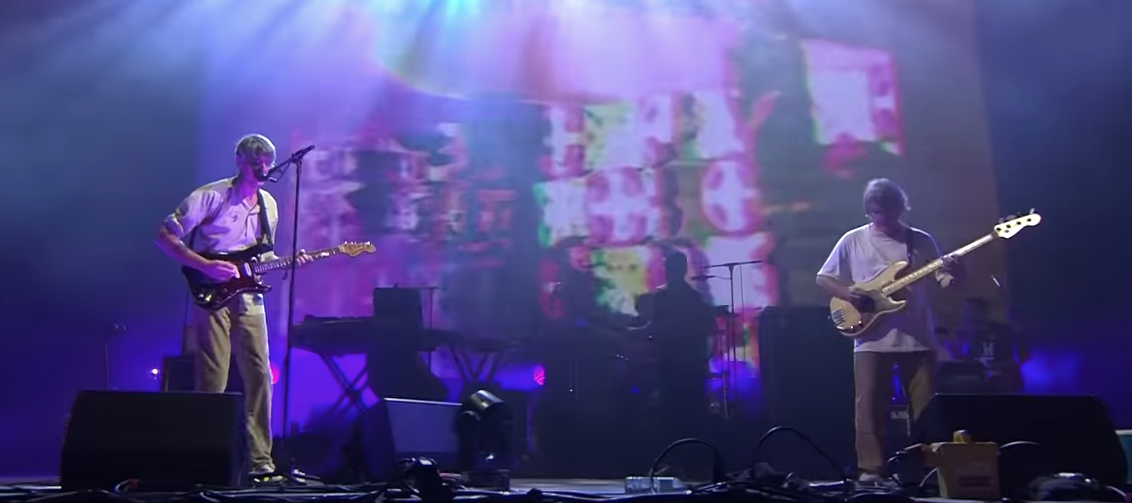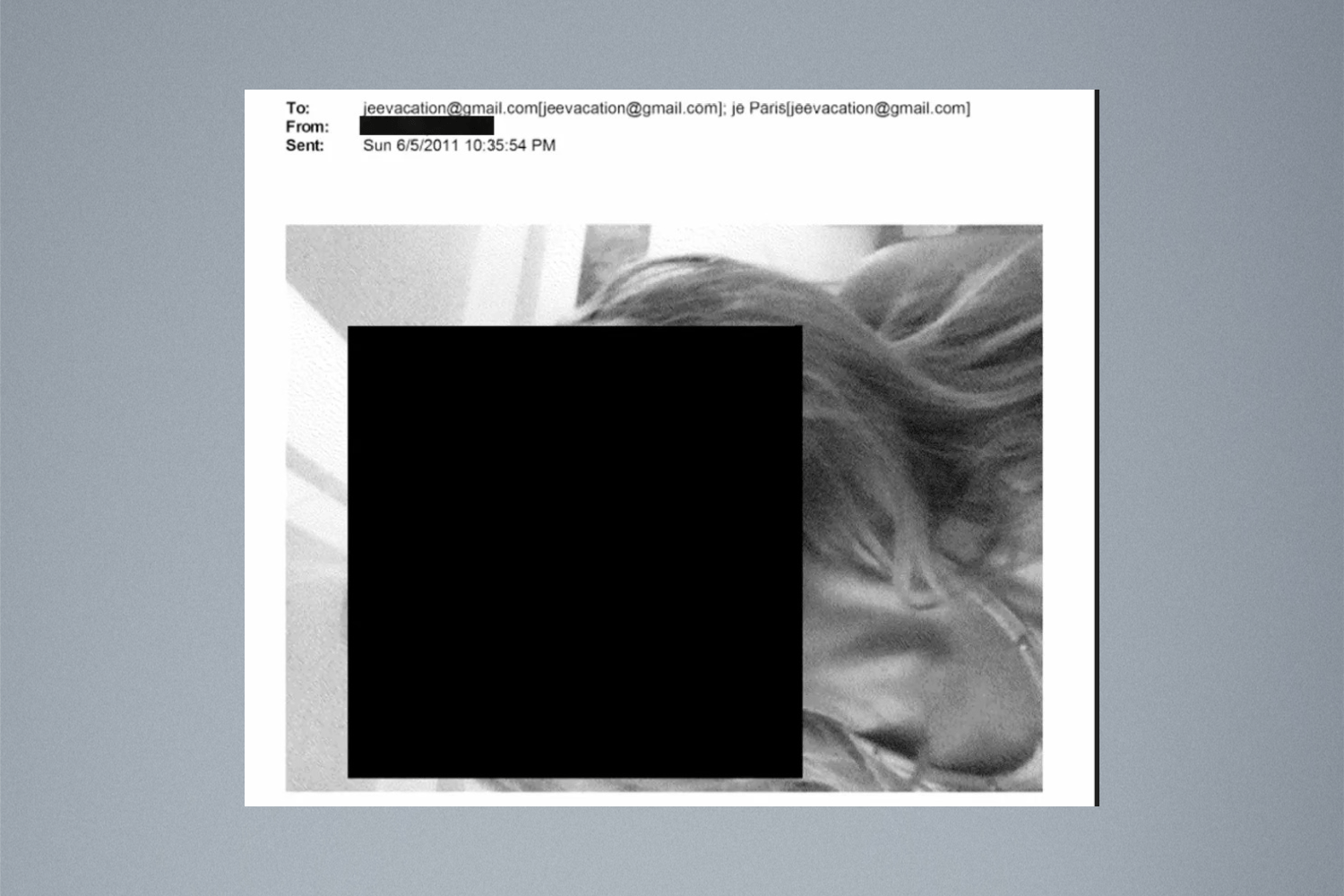You can never quarantine the past? Why, of course you can quarantine the past, old sport! There was no cozier corner of 1994dom in the U.S. last night than the Palace Theatre in St. Paul, where only guts, hairlines, and an absence of cigarette smoke indicated that more than three decades had passed since Pavement began to outline one densely imagined way of creatively mis-living your 20s in an ambivalently thoughtful manner. Any resemblance to life in the 21st century was purely coincidental. (Yeah I used three adverbs in one phrase back there. And. I. Made. It. Work.)
The band’s collared shirts were as unbuttoned or at least rumpled and untucked as they had been when that post-preppie anti-fashion un-statement dominated their subculture. But this wasn’t the Pavement that split in exhaustion and rancor in 2000—a few months too late for their saga to end neatly in the decade whose small corner they defined, the slackers. First off, dammit, they tried. (Beavis would be proud.) As anyone who caught their previous reunion tour in 2010 could tell you, Pavement are a tighter, more professional band then they were in their hit-or-miss heyday. Bonus: We got to hear them better than last time, when they were consigned to the Roy Wilkins a little ways up the road. They also feel mildly more timely now, as current indie rock shows more affinity with old Matador releases, than they did back when theatrically minded dodecatets with xylophone players dominated the scene.
Stationed far stage right, Stephen Malkmus could appear aloof between songs, though his performances retained that delicate balance of detached passion that is his gift, and he expressed some quiet words of gratitude toward the end of the night. These days his guitar work is expert rather than exploratory, another sign of accrued expertise that didn’t detract from a great show.
In contrast, Bob Nastanovich, gallivanting from second drum kit to tambourine to microphone, contributed mania to the edges of the songs like an actually useful Bez. Guitarist Scott “Spiral Stairs” Kannenberg was allotted his moment in the spotlight with “Kennel District.” In tandem with the solid, tuneful Mark Ibold on bass, drummer Steve West held things down, though a smidgen more oomph wouldn’t have derailed things. Newly incorporated touring keyboard player Rebecca Cole of Wild Flag filled out the sound.
But if these were middle-aged adults looking over their shoulders, their songs remain documents of certain stages in a young life. And I don’t just say that because I first heard them when stumbling through those stages myself, when they stuck push pins in my mental geography to mark forays and detours and retreats. Age has neither deepened or tarnished this music—the songs remain artifacts of a historic moment, and if younger listeners can tap into that sensibility too, well, 24 year olds across the decades have more in common than generational gap essentialists would have you believe.
Though Pavement were tagged lazily as avatars of slack diffidence in their day, taken as a piece, their albums charted a course between the pleasure and anomie of shiftless reverie and their dread and attraction of mature commitment in its broadest sense. So at the risk of being pedantic, always a risk when discussing a band that made an art of making an art of indirection, I’ll walk you chronologically through the tracks they jumbled about last night into a fine flowing set list.
At the start, Pavement were more a rumor than a band, with a rep built on Drag City EPs nobody I knew owned. The songwriting chops of “Box Elder” and the noisy outbursts of “Heckler Spray” would have, respectively, bowled me over and befuddled me if I’d have been cool enough to hear them at the time. It was only in 1992 that an inscrutable Joe Levy review of Slanted & Enchanted in the Village Voice drew a line in the sand for me: turn back to pop comforts or dive into a referential subculture that promised either infinite internal riches or tail-chasing irrelevance. (I chose both.) What I wasn’t prepared for was how legible that actual music was to anyone with a passing acquaintance with ’80s college radio (they kinda reminded me of Camper Van Beethoven, personally)—and how catchy.
Like R.E.M.’s Murmur, of all records, Slanted & Enchanted sounded just mysterious enough to trace out a path you might stray along without nudging you too forcefully. It’s both callow and visionary. No one can get away forever with a line like “You’re wrong, I am not one half of the problem” (from “Zurich Is Stained”), but there’s an experimental aura to the mis-tunings and lyrical dysfunction of “Trigger Cut” that suggests world of possibilities. Slanted & Enchanted documented that age when partially formed humans collide like poorly shot pool balls that wobble elliptically away from each other, then sought refuge in the shaggy postcollegiate jokes of the earlier EPs. Pavement drawled, yelped, warbled, shouted, and soloed in the language of les enfants de Ashbery et du Jolt Cola.
Two years later, with the major label gold rush of alternative so prevalent no one was underground enough to ignore it, Crooked Rain, Crooked Rain flirted with careerism. If nothing else, it seemed an alternative to the bleak blank space of a directionless young adulthood outlined in songs like “Stop Breathin,” which had me murmuring “dad they broke me” drunkenly in my own unmoored mid-20s, and the guitars’ nervous arpeggios still suggest late-night pacing the floor to me. For a band of smartasses accused of or credited with being steeped in that ’90s boogeyman “irony,” Pavement sure wrote a lot of sad fucking songs.
Crooked Rain’s commentary on the music biz is playful enough to survive its dated references. Rousing as the willful falsettos and bitchy scene snark of “Cut Your Hair” remains, is there any way but literally to take “Songs mean a lot when songs are bought” in 2022? And “Range Life,” told from the perspective of what life on the road might be like 30 years in the future, hits different when that time has actually passed. Last night, Malkmus updated one of the song’s lyrics to vent “All those cops are bastards,” though fortunately (?) Billy Corgan remains such an easy a target that the crowd was happy to shout along about how little they gave a fuck about what Smashing Pumpkins mean.
Wowee Zowee, retroactively deemed the band's peak in some circles, seemed content to drift inward for a spell, reaching its ideal moment of resignedly stoned stasis in the chorus of “Father to a Sister of Thought”: “I know I’ll never go.” Still, last night the band pulled two (by Pavement standards) “protest songs” form their bag: “Serpentine Pad” (“I don't need this corporation attitude!”) and “Fight This Generation” (the answer to “which?” remains “all of them”) and the cryptic “Grounded.” Too bad they didn’t do the one where S.M. shouts out Jacob Javits.
Two years later, Malkmus seemed more explicit about his rather ordinary aging concerns on Brighten the Corners, as one does ‘round about 30. Did he really long for a “Shady Lane” to retire to with that special-enough someone, or did he just long to long for it? (No peeking ahead in his bio to answer that one.) The band also revisited the dreamy “Starlings of the Slipstream” and the resignation-resistant album-closer “Fin.” The hooks fell into place more neatly on Brighten the Corners as well, with psych-y guitars less adorning the songs than drawing them out as codas.
A full album coda to the band’s career itself, Terror Twilight is a cautionary tale about a strife-riven band choosing to working with Radiohead’s producer. The night began with the TT track “Major Leagues,” Malkmus’s most direct song about stepping up to life’s plate, its message as forthright as its controlled jangle-rock, a fine companion piece to “Spit of a Stranger,” as straight a love song as Malkmus was or is capable of. “The Hexx” represented the dreamier, jammier direction of an album that gets short shrift on account of its backstory.
Not a bad setlist, huh? The encore began with Pavement's fluke social-media era hit, “Harness Your Hopes,” a later b-side which Spotify’s algorithm tricked youngsters into believing was the band's most famous song long before “the freaks have stormed the White House” felt prescient. Now they play it every night. And fittingly, for a band that has scrawled some of their most indelible moments in the margins of their career (honestly, I haven’t even kept up the ephemera their reissues have collected), there were a few other deep cuts for ardent newbs to claim as their own, stretching back to “Lions (Linden)” and “Shoot the Singer (1 Sick Verse),” with the classic absurdist opening line “Someone took/In these pants.” At 1:30, the EP-only track “Gangsters & Pranksters,” is supremely TikTok ready—not that I expect your kids to be lip-syncing “I’ve got all this Harvard LSD/Why won’t anyone fuck me?” any time soon but WHAT IF?
Pavement closed punctually 90 minutes after they began, ending with “Two States,” a ragged S&E Fall homage/rip about the need for North Californian secession, in case you wondered how seriously this band ever took politics. Before barking out the frantic rant, Nastanovich dedicated it to late Minneapolis rock hero Ed Ackerson. (He also localized the stage banter earlier in the night by asking if anyone from Medina or Virginia was in the house.) Twenty-six songs packed the terse, taut show, and good on Pavement for shuffling off the call for a crafted narrative that critics like me are still imposing on them after all these years. The message, if there was one, was: We’re still all here, this all happened once upon a time, and it still sounds damn good.
Setlist
Feed 'em to the (Linden) Lions
Shoot the Singer (1 Sick Verse)
Encore







